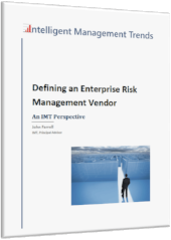The disastrous path of MF Global will draw criticism as the latest among risk management failure examples, but this case highlights a particularly dysfunctional risk culture where the decisions of the powerful are a fait accompli. The Wall Street Journal's chronicling of the events leading up to the collapse expose leadership that circumvented warnings and typical governance accountability creating a “bad recipe” for risk management. The concentration of power in this case was also a recipe for just poor business decision making. 
Upcoming congressional hearings will provide more insights, but it seems clear MF Global’s future course was unalterably set with the decision to place Jon Corzine at its helm in March 2010. There are two perspectives to consider for lessons from this collapse: (1) Mr. Corzine’s enablers and (2) the pitfalls of the audacity of power-driven management styles.
Empowering a Bold Decision Maker
The company and Wall Street analysts touted the Corzine appointment as a strong move to embolden investment strategy and to gain someone who could help navigate Sarbanes-Oxley and Dodd-Frank regulatory requirements. A bold choice for sure.
Corzine held trading strategy authority checked only by board oversight which relented early to his European sovereign debt investment plans. He hired over 1,000 employees who loyally executed his strategic direction and eschewed the warnings and questions from at least one trader and his inherited Chief Risk Officer Michael Roseman. Mr. Roseman, replaced in March 2011, will end up portrayed as the would-be hero in future MF Global case studies.
External parties with the potential to tame Corzine’s plan also became enablers by giving more latitude on risk strategy than seemed warranted in hindsight. Lawmakers are raising questions about the leniency of credit-rating agencies toward MF Global and they plan to investigate the failure of the Commodity Futures Trading Commission, headed by Corzine’s former Goldman colleague Gary Gensler, to provide effective regulatory oversight.
Self Confidence Should Never Block Checks on Decision Biases
Setting aside the roles of company and external enablers surrounding Corzine, the failure of individual power and decision making provides more fundamental lessons in this case. In their recently released study “The Detrimental Effects of Power on Confidence, Advice Taking, and Accuracy,” Professors See, Morrison, Rothman, and Soll document their findings on the interplay of power and decision biases. Using the results of four experiments, they prove a positive correlation between power and confidence in one’s own opinion while showing power has a negative correlation with accepting advice and the accuracy of decisions.
The existence of each correlation is not surprising, but the message for decision making is potent when they are considered in toto. If advice seeking wanes as executives gain more power, and errors increase with unilateral decisions, no one should consider themself above the need for basic risk scrutiny for effective decision making.
MF Global decided to raise their risk appetite under Corzine’s largely unimpeded leadership and ended up raiding customer accounts to cover a bad strategic decision. Over $1 billion of customer funds are still missing to date.
While MF Global abandoned standard risk management processes, governance, and business ethics to achieve their corporate objectives, questions will arise about how risk management and regulatory oversight can improve to prevent these failures. The frequent call for boards to fully commit to risk management principles applies here, but See, Morrison, et al in their study also warn there is an almost impenetrable resistance among executives to change their opinions once stated.
In the interest of guiding management trends away from biases, decision makers should be encouraged to refrain from taking a position until given a full set of analysis for their consideration. This means pressure to funnel information to the earlier stages of business decision-making processes will continue to mount in the era of big data.
ADDENDUM:
The Atlantic explores the theory, and evidence, that leaders actually lose the mental capacity to read and empathize with others in their August 2017 article Power Causes Brain Damage. Perhaps Mr. Corzine's brain still has the opportunity to help advance the study of biases in business decision making.







